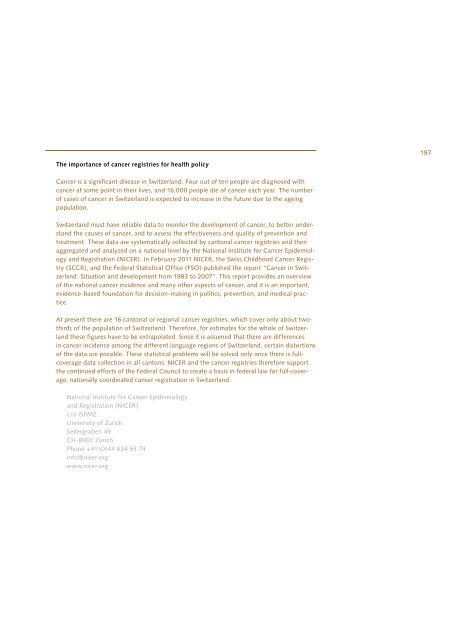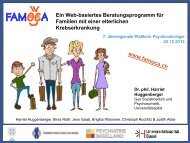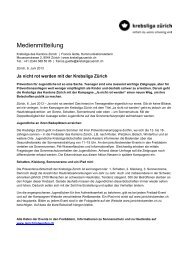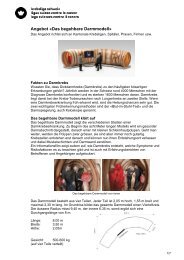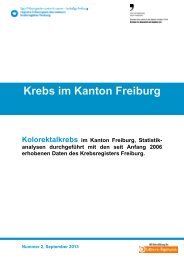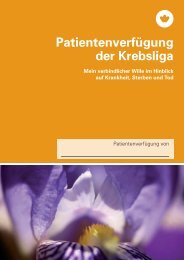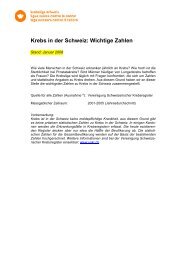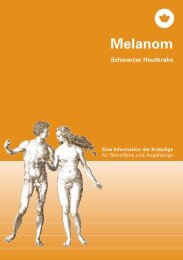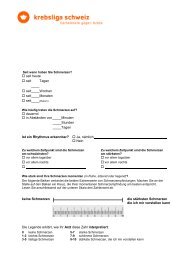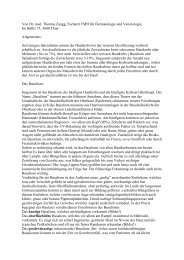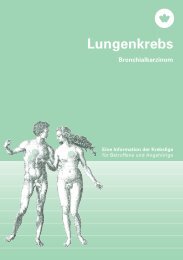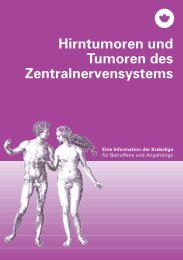Cancer Research in Switzerland - Krebsliga Schweiz
Cancer Research in Switzerland - Krebsliga Schweiz
Cancer Research in Switzerland - Krebsliga Schweiz
You also want an ePaper? Increase the reach of your titles
YUMPU automatically turns print PDFs into web optimized ePapers that Google loves.
The importance of cancer registries for health policy<br />
<strong>Cancer</strong> is a significant disease <strong>in</strong> <strong>Switzerland</strong>: Four out of ten people are diagnosed with<br />
cancer at some po<strong>in</strong>t <strong>in</strong> their lives, and 16,000 people die of cancer each year. The number<br />
of cases of cancer <strong>in</strong> <strong>Switzerland</strong> is expected to <strong>in</strong>crease <strong>in</strong> the future due to the age<strong>in</strong>g<br />
population.<br />
<strong>Switzerland</strong> must have reliable data to monitor the development of cancer, to better understand<br />
the causes of cancer, and to assess the effectiveness and quality of prevention and<br />
treatment. These data are systematically collected by cantonal cancer registries and then<br />
aggregated and analyzed on a national level by the National Institute for <strong>Cancer</strong> Epidemiology<br />
and Registration (NICER). In February 2011 NICER, the Swiss Childhood <strong>Cancer</strong> Registry<br />
(SCCR), and the Federal Statistical Office (FSO) published the report “<strong>Cancer</strong> <strong>in</strong> <strong>Switzerland</strong>:<br />
Situation and development from 1983 to 2007”. This report provides an overview<br />
of the national cancer <strong>in</strong>cidence and many other aspects of cancer, and it is an important,<br />
evidence-based foundation for decision-mak<strong>in</strong>g <strong>in</strong> politics, prevention, and medical practice.<br />
At present there are 16 cantonal or regional cancer registries, which cover only about twothirds<br />
of the population of <strong>Switzerland</strong>. Therefore, for estimates for the whole of <strong>Switzerland</strong><br />
these figures have to be extrapolated. S<strong>in</strong>ce it is assumed that there are differences<br />
<strong>in</strong> cancer <strong>in</strong>cidence among the different language regions of <strong>Switzerland</strong>, certa<strong>in</strong> distortions<br />
of the data are possible. These statistical problems will be solved only once there is full-<br />
coverage data collection <strong>in</strong> all cantons. NICER and the cancer registries therefore support<br />
the cont<strong>in</strong>ued efforts of the Federal Council to create a basis <strong>in</strong> federal law for full-coverage,<br />
nationally coord<strong>in</strong>ated cancer registration <strong>in</strong> <strong>Switzerland</strong>.<br />
National Institute for <strong>Cancer</strong> Epidemiology<br />
and Registration (NICER)<br />
c/o ISPMZ<br />
University of Zurich<br />
Seilergraben 49<br />
CH-8001 Zurich<br />
Phone +41 (0)44 634 53 74<br />
<strong>in</strong>fo@nicer.org<br />
www.nicer.org<br />
197


